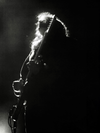How the Hell Did Mk.gee Get This Big?
The art-rock breakout is reshaping the slickest sounds of the ’80s into something startling and new.

Onstage at Manhattan’s Irving Plaza over the summer, Mk.gee looked like a shadow of a rock star. His guitar-wielding silhouette was almost completely backlit by two roving beams, as if he were turning away from a lighthouse’s promise of safe harbor. The music matched the mystery: gnomic songs dotted with underwater distortion, muted rhythms, and the occasional anguished shriek. The excitable crowd sang along to tracks from his debut album, Two Star & the Dream Police, even though, on record, the lyrics are often unintelligible. The effect of these sing-alongs was uncanny, like everyone was deeply communing with a phantom.
Mk.gee, aka singer, songwriter, guitarist, and producer Michael Gordon, is one of 2024’s most unlikely new stars. Just a few months after selling out the 1,100-capacity Irving Plaza, he played two more New York gigs, to around 4,500 more people. He has upwards of 1.8 million monthly listeners on Spotify. According to a recent New York Times profile, Justin Bieber has enlisted Gordon for writing and recording sessions, making the prospect of Bieber’s forthcoming dad album a lot more intriguing.
While listening to Mk.gee’s slippery and unpredictable music, one can’t help but wonder: How did a guy hellbent on obscuring the typical trappings of popular music come to command such a widespread and ravenous audience?





